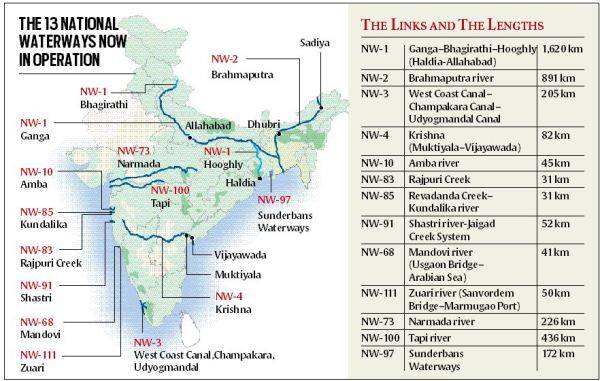Ahmedabad
(Head Office)Address : 506, 3rd EYE THREE (III), Opp. Induben Khakhrawala, Girish Cold Drink Cross Road, CG Road, Navrangpura, Ahmedabad, 380009.
Mobile : 8469231587 / 9586028957
Telephone : 079-40098991
E-mail: dics.upsc@gmail.com

Inland Waterways in India
News: The government aims to develop the Eastern Grid with 5,000 km of waterways, announced Sarbananda Sonowal, Union Minister of Ports, Shipping and Waterways.
Background:
The development of this grid will not only boost regional integration and accelerate development but it will further
deepen eastern India's trade within BBIN countries (Bangladesh, Bhutan, India, Nepal).
It will also further amplify trade potential with countries like Myanmar, Thailand, Malaysia and Singapore.
What are Inland waterways?
An inland waterway is a navigable channel used to transport goods, materials, or other movable objects. Inland waterways consist of rivers, lakes, canals and backwaters. Rivers and lakes are natural waterways, whereas canals and backwaters are artificial.
What is the potential of Inland waterways in India?
As per the National Waterways Act, 2016, 111 National waterways have been declared.
Inland Water Transport in India has only 0.5% of total transport; compared to 42% in Netherlands, China 8.7%; USA 8.3% and Europe 7%. (Source: JalMargVikasProject)
As per Maritime India Vision (MIV) 2030 document, cargo movement on National Waterways is targeted as 200 MMT by 2030 from current level of 83.61 Million Metric Tonne (MMT) during FY- 2020- 21.
What is the Jal Marg Vikas Project?
The project is implemented by Ministry of Ports, Shipping and Waterways and Inland Waterways Authority of India with support from World Bank.
It aims to develop the stretch between Varanasi to Haldia (on National Waterway 1) for navigation of large vessels weighing up to 1500-2000 tonnes.
Multi-Modal Terminals are a part of Jal Marg Vikas project (JMVP).
Haldia MMT is one of the three Multi-Modal Terminals being constructed on Ganga, 2 other MMTs constructed in Sahibganj and Varanasi under the project.
Government initiatives
Interlinking of Rivers
Jal Marg Vikas Project
Sagarmala project's focus on IWT
Proposed allocation of 2.5% of proceeds of Central Road Fund for Waterways
MOU's signed with Bangladesh to reduce logistic cost of Cargo
What are benefits of Inland Waterways?
Capital Savings
The capacity augmentation of navigation on NW-1 through the Jal Marg Vikas Project estimated to entail a capital expenditure of Rs. 2.53 crore per km only. Compared to this road and rail each cost over Rs 5 crore per km.
Cost saved in Transportation
IWT would have positive impact on the overall logistics cost. For example, 1 Horse Power energy moves 150 kg on road, 500 kg on rail and 4000 kg on water.
Thus, it will reduce per unit costs and also bring down logistics costs. Even, the National Logistic policy envisages to bring down Logistics cost to GDP from current 14-15% to 10% of GDP.
Environment Friendly
Lesser fuel consumption per ton km which will result in fewer CO2, Sox, NOx, Particulate Matter emission. Switching to IWT will ensure lesser burden on road and rail transportation.
LNG/CNG engines have lower noise level than diesel engines, hence less impact on ambient noise level.
Boost to regional trade
IWT give boost to trade between India and Bangladesh, India and Myanmar through Kaladan project.
Boost to Connectivity
It help create seamless interconnectivity connecting hinterlands along navigable river coasts and coastal routes. Further, riverine routes are likely to play a crucial role in connecting the north-eastern states to the mainland.
Other benefits
Inland Waterways hold huge potential for domestic cargo transport, cruise, tourism and passenger traffic.
Development of inland waterways will help in the generation of job opportunities
What are the challenges?
Inland waterways have low transport speed thus not suitable where time is an important factor
Limited area of operation depending on infra premises, connectivity, depth or river water.
Perception of IWT investment as high risk investment has deterred private sector from participating and investing in it and traditionally banks have avoided sanctioning loans to such projects as well.
Development of modern-day multimodal terminals, jetties, ferry points and river information systems is highly capital intensive.
Dredging operations will damage river bed, and can lead to change in habitats for various aquatic flora and fauna. Dredging may also impact aquifers along the river, damaging the ability of water to percolate underground.
Ecological impacts can have implications for livelihoods of people dependent on the rivers and creeks. For example: impact on fishing community, people dependent on riverbed cultivation. Displacement is another major concern as land is needed for number of facilities like ports, jetties, and other infrastructure.
Way Forward
Strengthening public-private partnership has the key role to play in developing the inland waterways sector.
Measures should be taken to develop basic infrastructure, address technological bottlenecks and maintenance of rivers to ensure year-round navigability
Ensure seamless connectivity, develop Multimodal infrastructure and make inland water transport economically more viable.

Address : 506, 3rd EYE THREE (III), Opp. Induben Khakhrawala, Girish Cold Drink Cross Road, CG Road, Navrangpura, Ahmedabad, 380009.
Mobile : 8469231587 / 9586028957
Telephone : 079-40098991
E-mail: dics.upsc@gmail.com
Address: A-306, The Landmark, Urjanagar-1, Opp. Spicy Street, Kudasan – Por Road, Kudasan, Gandhinagar – 382421
Mobile : 9723832444 / 9723932444
E-mail: dics.gnagar@gmail.com
Address: 2nd Floor, 9 Shivali Society, L&T Circle, opp. Ratri Bazar, Karelibaugh, Vadodara, 390018
Mobile : 9725692037 / 9725692054
E-mail: dics.vadodara@gmail.com
Address: 403, Raj Victoria, Opp. Pal Walkway, Near Galaxy Circle, Pal, Surat-394510
Mobile : 8401031583 / 8401031587
E-mail: dics.surat@gmail.com
Address: 303,305 K 158 Complex Above Magson, Sindhubhavan Road Ahmedabad-380059
Mobile : 9974751177 / 8469231587
E-mail: dicssbr@gmail.com
Address: 57/17, 2nd Floor, Old Rajinder Nagar Market, Bada Bazaar Marg, Delhi-60
Mobile : 9104830862 / 9104830865
E-mail: dics.newdelhi@gmail.com